What is the history of the translation of the Bible into English?

Most people have at least one Bible in their homes. But do we really appreciate it? We have ready access to very affordable Bibles. We even have access to free Bibles. And we have access to multiple different English translations of the Bible.
That hasn’t always been the case for God’s people. If we look at the Bible in the context of the history of mankind, we are in a very privileged position. Because the Bible is so readily available in so many ways, it is easy for us to take it all for granted.
What is the history of the translation of the Bible into English? How did we come to get the Bible we know and love?
Let’s start off by considering some simple questions.
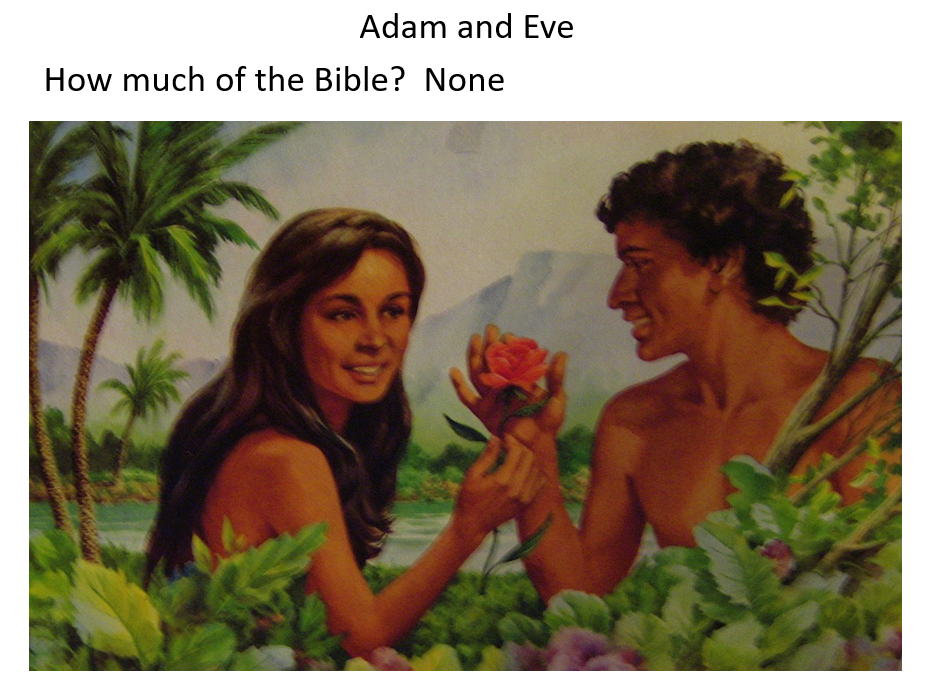
How much of the Bible did Adam or Eve have? The story of Adam and Eve is covered in the first 4 chapters of Genesis. They would have had the knowledge contained in those chapters, but of course the Bible wasn’t written then.
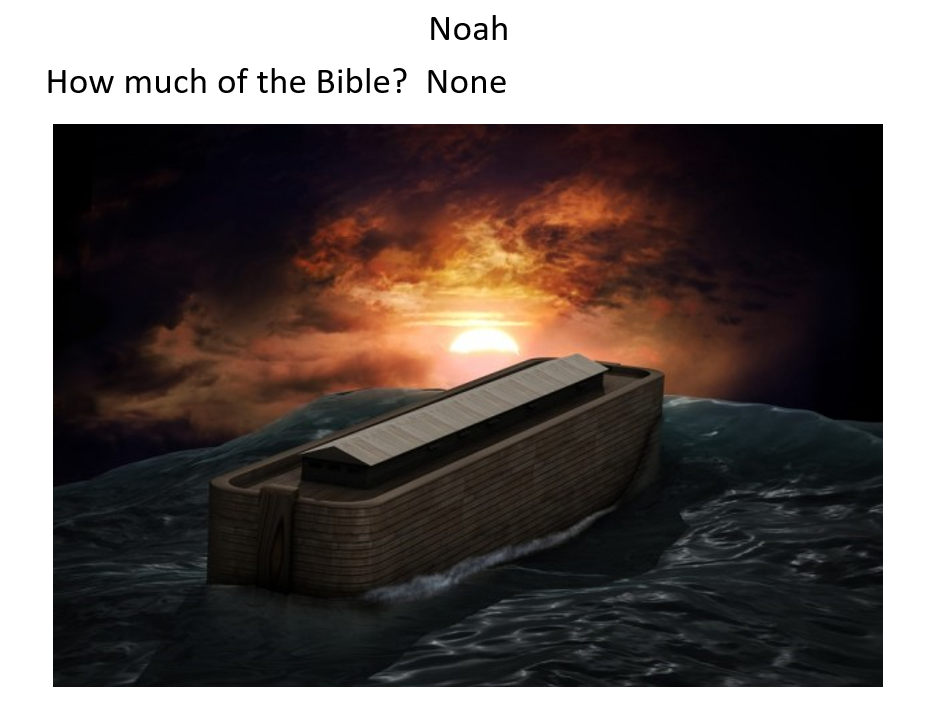
How much of the Bible did Noah have? The story Noah is covered in the first 10 chapters of Genesis, that’s all. Noah would have had the knowledge contained in those chapters, but of course the Bible wasn’t written then. By the time Noah died, mankind had been on earth for about 2000 years, about 1/3 of the time of mankind’s existence. 1/3 of mankind’s existence on earth had passed, yet the Bible was not available.
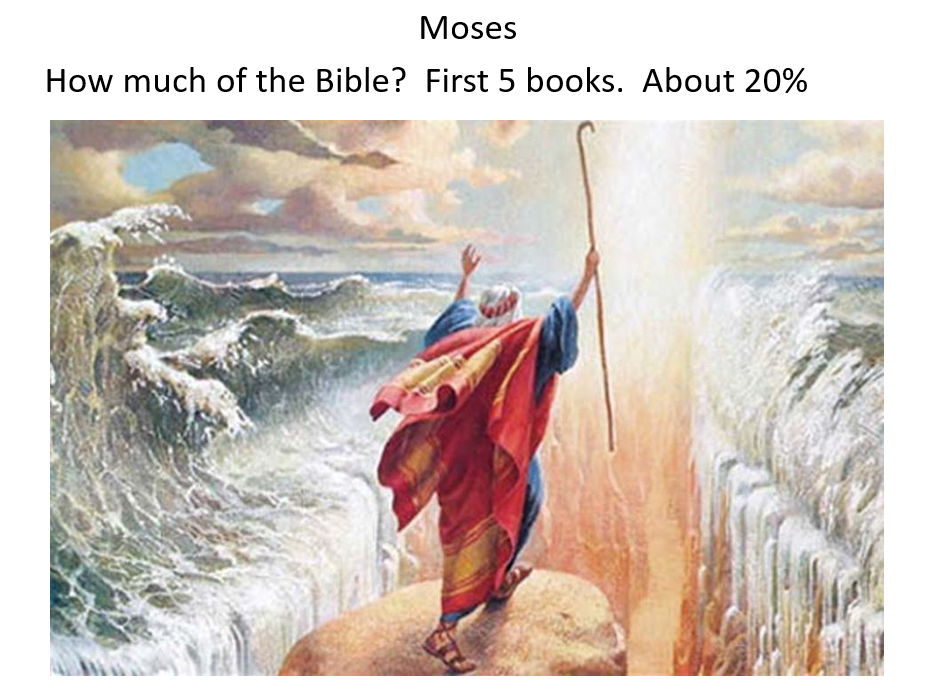
What about Moses and the ancient Israelites in his time? How much of the Bible did they have access to? Basically, just the first five books of the Bible, 1/5 or 20%. By the time of Moses, mankind had been on the earth for about 2½ thousand years.
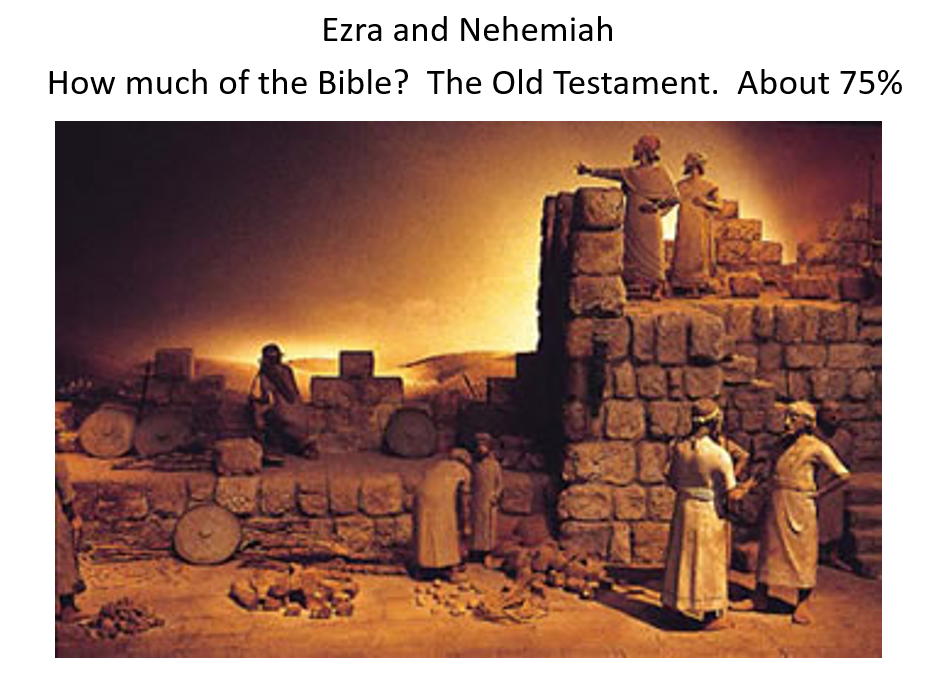
The Old Testament was completed about 500 BC, during the time of Ezra and Nehemiah. How much of the Bible did they have access to? The Old Testament, ¾ or 75%. So after about 3½ thousand years of human existence, the Old Testament is complete.
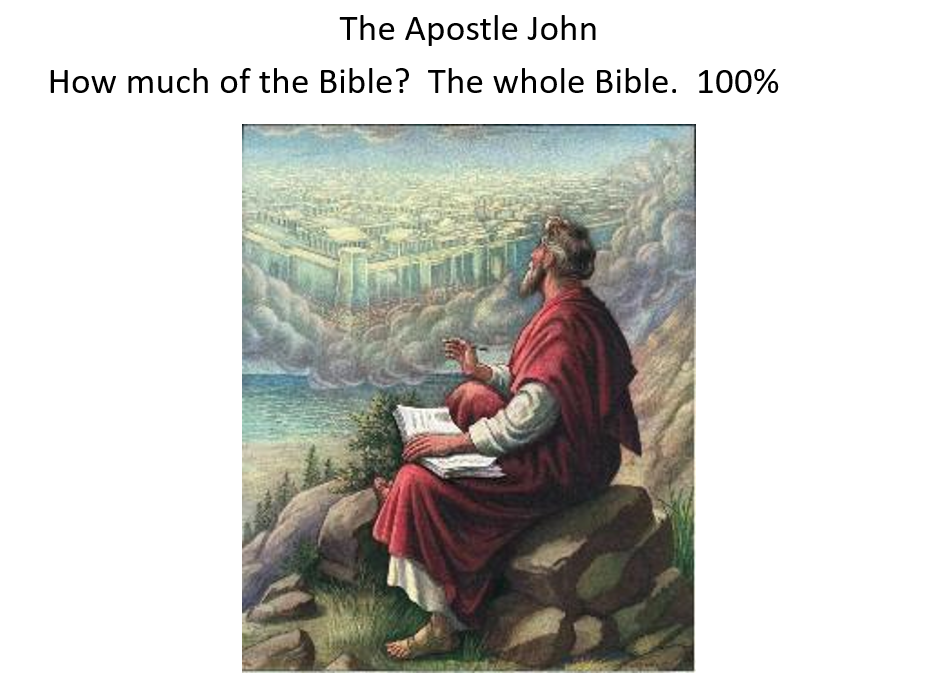
The New Testament was completed about AD 100, when the apostle John wrote the book of Revelation. It took over 4000 years before mankind had the complete Bible. The complete Bible has only been in existence during the last 1/3 of mankind’s existence.
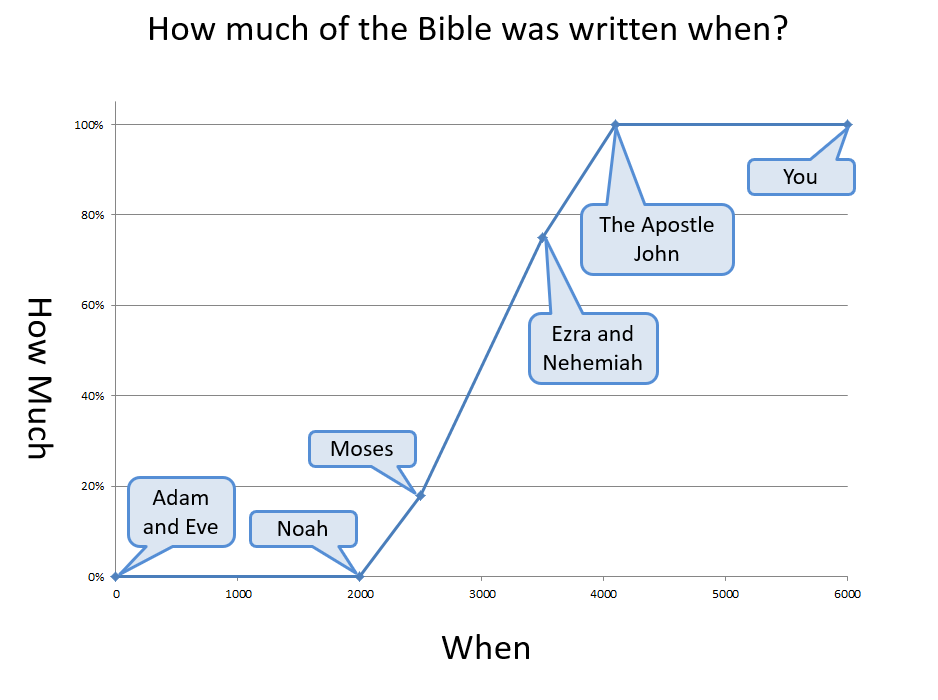
Here’s a chart showing what we’ve just covered. Along the bottom is time in years, and on the side is how much of the Bible was written. Roughly, the first 2000 years there is no Bible. The next 2000 years Bible is written. And it’s only the last 2000 years that mankind has had the Bible. Mankind had to wait 4000 years before the Bible was completed. But once completed, how easy was it to get access to the Bible?
What if you lived anywhere between AD 100 and AD 1500? Would you have had easy access to the Bible? No, for two reasons.
Firstly, books were very expensive because printing hadn’t been invented. All books were painstakingly hand copied. People couldn’t afford their own copy unless they were wealthy.
Secondly, to make matters even more difficult, the translation most readily available was in Latin. So, unless a people understood Latin, or Hebrew and Greek, they couldn’t read the Bible. They had to rely on someone else to explain to them what the Scriptures meant.
The Latin Vulgate translation was a translation of the Hebrew OT and the Greek NT into Latin. It appeared in the late 300’s and became the official translation of the Roman Catholic Church. Because most people could not understand, Hebrew, Greek or Latin they couldn’t read the Bible. They had to rely on the clergy to tell them what the Bible said. The Latin Vulgate translation had some rather convenient translation errors. Errors which helped cement the Catholic Church’s grip on power.
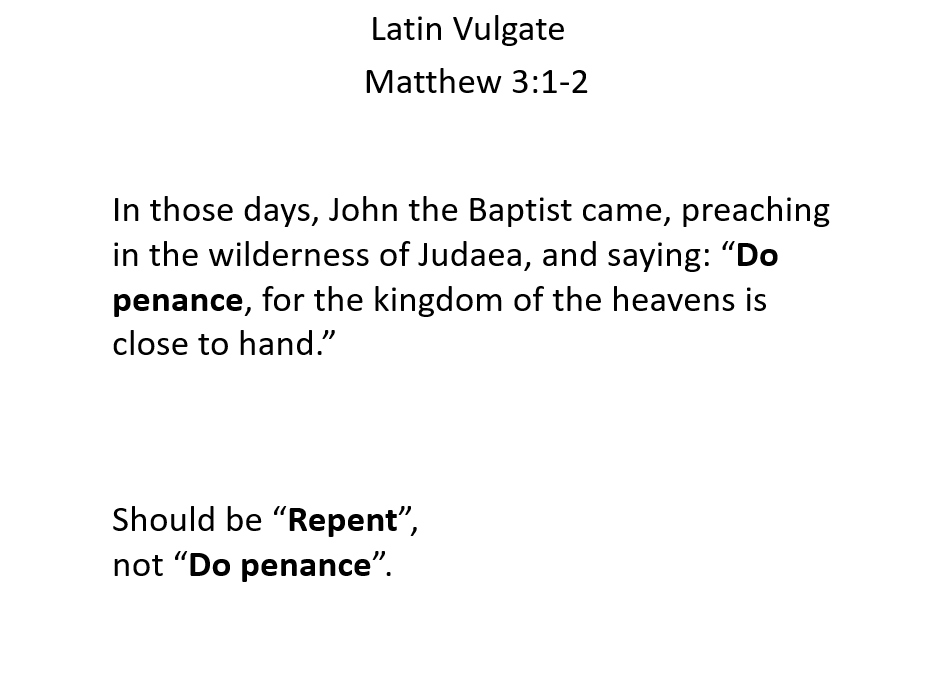
Here is an example of an error in the Latin Vulgate. Of course, this has been translated from Latin into English.
Mat 3:1-2 In those days, John the Baptist came, preaching in the wilderness of Judaea, and saying: “Do penance, for the kingdom of the heavens is close to hand.”
In this translation, John the Baptist seemed to be demanding that they “do penance”, that is, find a priest, confess their sins, and carry out any acts of penance this priest might require of them. The Latin Vulgate translation supported the Catholic idea of doing penance. Of course, the Scripture doesn’t mean do penance, but simply, “repent”.
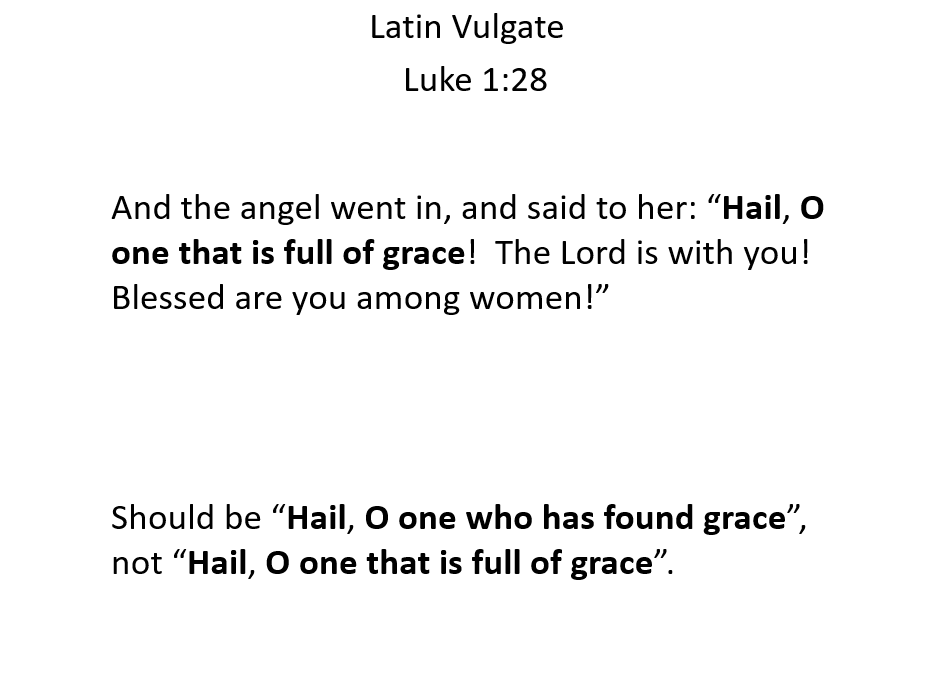
Here is another example of an error in the Latin Vulgate.
Luke 1:28 And the angel went in, and said to her: “Hail, O one that is full of grace! The Lord is with you! Blessed are you among women!”
This passage makes it seem that Mary could bestow favour or grace on others, which is of course what the Catholic Church believes. This translation error supports praying to Mary. It should be translated “Hail, O one who has found grace.”
The first example implies that the clergy have superiority over the common man. The second example implies that Mary has superiority over the Christians.
From AD 100 to AD 1500 mankind had a Bible, but it wasn’t readily accessible to the common man. There were two reasons for this situation. Firstly, he couldn’t afford it, because books were expensive. Secondly, he couldn’t read it because it wasn’t in his language. He had to rely on the clergy to tell them what the Bible said.
The invention of printing in Europe in the mid 1400’s, resolved the first of these problems. The invention of printing made the Bible an affordable household item. As mentioned earlier, before printing, only very rich individuals could afford their own Bible.
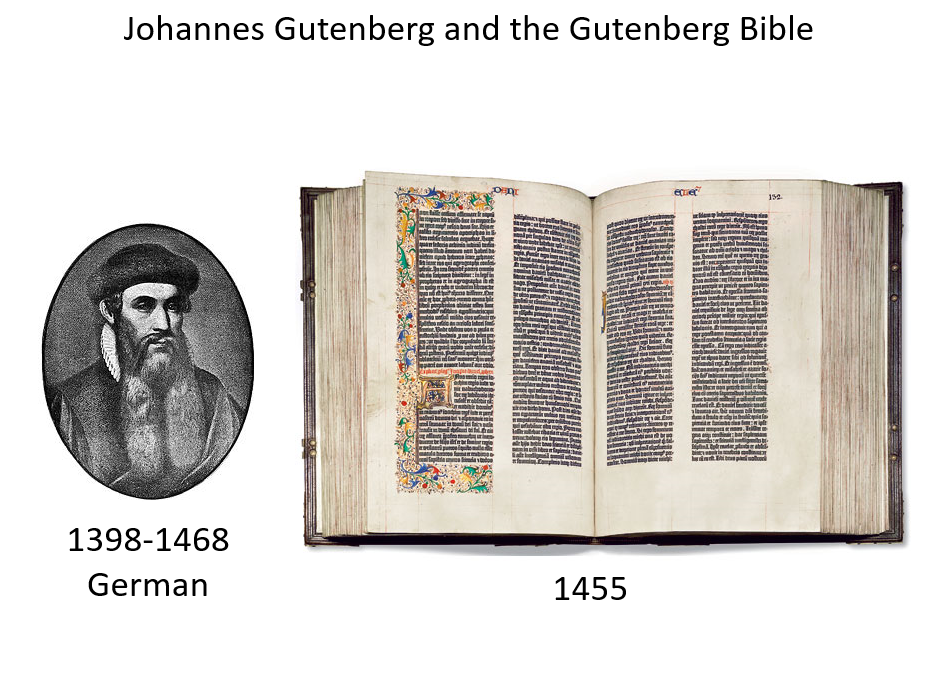
The first Bible printed was the Latin Vulgate. It is known as the Gutenberg Bible, because it was printed by Johannes Gutenberg in about 1455.
What about the second problem? The Bible was still not available in the language of the common man.

In the middle ages in Europe, there was a battle going on, known as the Protestant Reformation. Reformers such as John Wycliffe and Martin Luther believed that every man should have the right to read and interpret the Bible for himself, rather than accepting the teachings of the Catholic Church.
John Wycliffe argued for the translation of the Bible into his native English. He said that the common man had a right to read the Bible in his own language, rather than be forced to listen to what the clergy wanted him to hear. Wycliffe pointed out the clergy (the Catholic Church) had a vested interest in not allowing the common man access to the Bible. Both the reformers and the Catholic Church realised the common man would discover the massive discrepancy between the lifestyles of the clergy and those practiced by Christ and his apostles.
This idea sent shockwaves throughout the church establishment of the day. The view of the clergy was: Christ put them in charge, so what right had the common man to get involved with its affairs. Their lifestyle and power were seriously threatened. Translating the Bible into English would break the clerical monopoly on the text and allow it to be placed into the hands of the common man.
The Reformation was a movement of empowerment. It was a real threat to the power and wealth of the Catholic Church.
The Catholic Church strongly opposed what the reformers wanted. It did all it could to suppress the Reformation. In fact, it panicked. The mere possession of an English Bible was considered evidence of heresy. English kings and bishops feared that this might cause the common English man to rise in revolt and overthrow them.
So, they blocked the production of an English Bible in England. The translation of the Bible into English was decreed illegal by a law known as the “Constitutions of Oxford”. The translation of the Bible into English was decreed illegal!
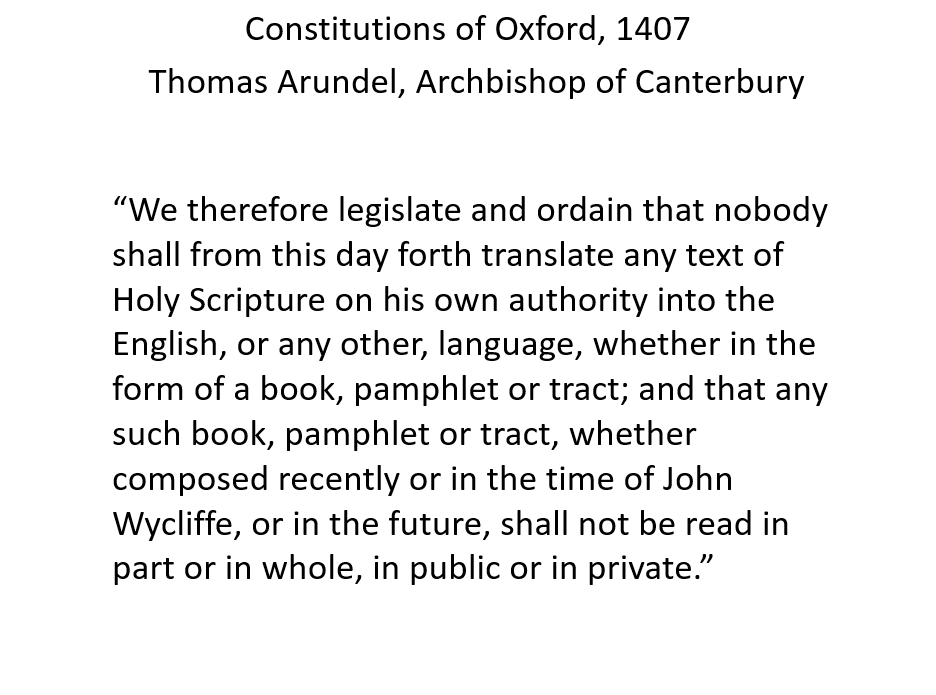
Here is a quote from Thomas Arundel, Archbishop of Canterbury. This is from 1407 and is one paragraph in a document known as the Constitutions of Oxford.
We therefore legislate and ordain that nobody shall from this day forth translate any text of Holy Scripture on his own authority into the English, or any other, language, whether in the form of a book, pamphlet or tract; and that any such book, pamphlet or tract, whether composed recently or in the time of John Wycliffe, or in the future, shall not be read in part or in whole, in public or in private.
To translate the Bible into English was an offense, punishable by burning at the stake.
Other European countries made more progress.
The first printed German Bible appeared 1466. This was based on the Latin Vulgate. 20 years later there were 9 different German Bibles in print. But there was no hint of an English Bible, despite the efforts of John Wycliffe and his followers.
The first printed French Bible appeared in 1530.
It wasn’t until the 1600’s that English translations of the Bible were freely available and affordable for the ordinary person. That, in large part, was due to the efforts of a man named William Tyndale

In the early 1500’s William Tyndale translated the New Testament into English from the Greek. But he had to move away from England to Antwerp, Holland, for fear of his life. Tyndale’s translation of the New Testament had immense impact. It was being smuggled into England by 1526 and read by the common man.
The immediate reaction of the church to this was opposition. Throughout 1526, they did all they could to suppress it. The Catholic Church officials drew up a list of prohibited books which included all of Luther’s books and Tyndale’s New Testament. Copies of Luther’s and Tyndale’s books were publicly burned in England. They were burning those parts of the Bible which had been translated into English.
The king of England at this point was Henry VIII. He broke away from the Catholic Church in 1533. The Catholic Church at that time in England became the Church of England.
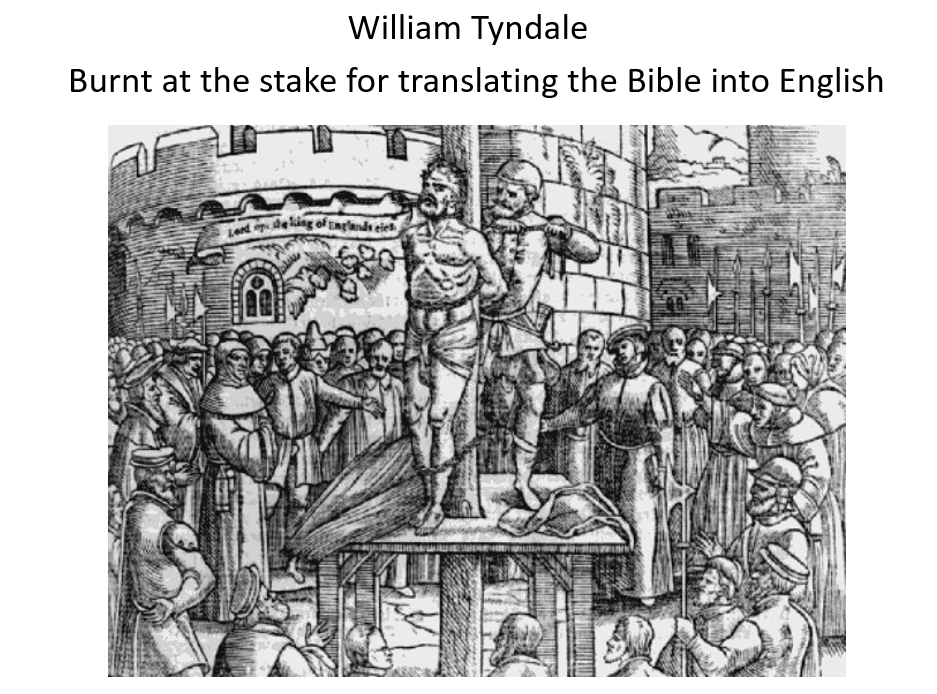
Eventually, Tyndale was betrayed and arrested in Antwerp in 1535 and held in a castle near Brussels. He was tried on a charge of heresy in 1536 and condemned to be burned to death. Tyndale “was strangled to death while tied at the stake, and then his dead body was burned”.
Tyndale lost his life for translating the New Testament and the Pentateuch (first five books of the Bible) into English.
The church and state (Henry VIII) killed Tyndale. Yet, even though they killed him, they were losing the battle in suppressing Tyndale’s translation. So, they decided to produce their own version of the Bible. As we will see, the Bible which eventually became the state sanctioned version, supported in its translation the hierarchy and institution of the Church of England.
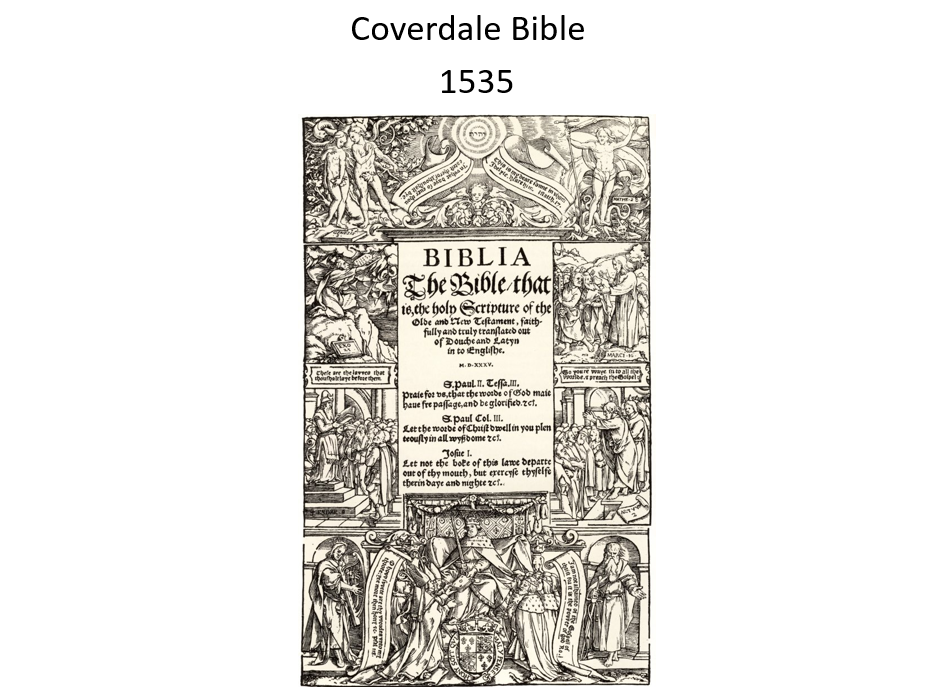
The first complete English translation of the Bible, which was also the first printed translation into English, appeared in 1535. Known as the Coverdale Bible it was essentially a compilation of other translations. It relied heavily on Tyndale’s translation of the New Testament and Pentateuch and the inaccurate Latin Vulgate for the other books of the Bible.
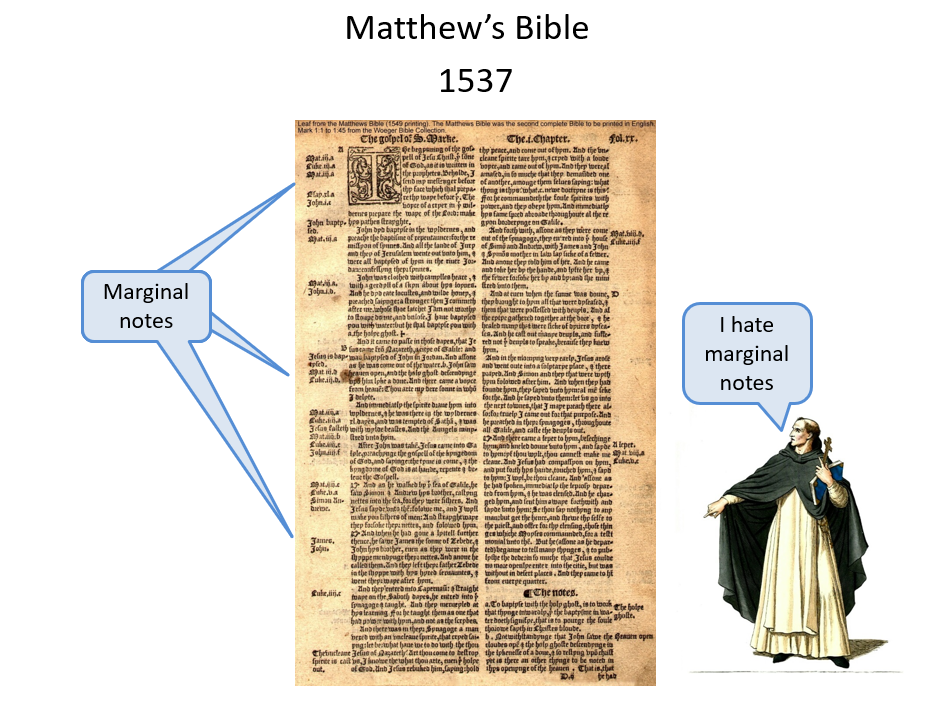
Matthew’s Bible appeared in 1537, which was based on the Coverdale Bible but had many marginal notes. These marginal notes worried the clergy because they feared that the common man would read them and be influenced against the Church of England and its unbiblical practices.
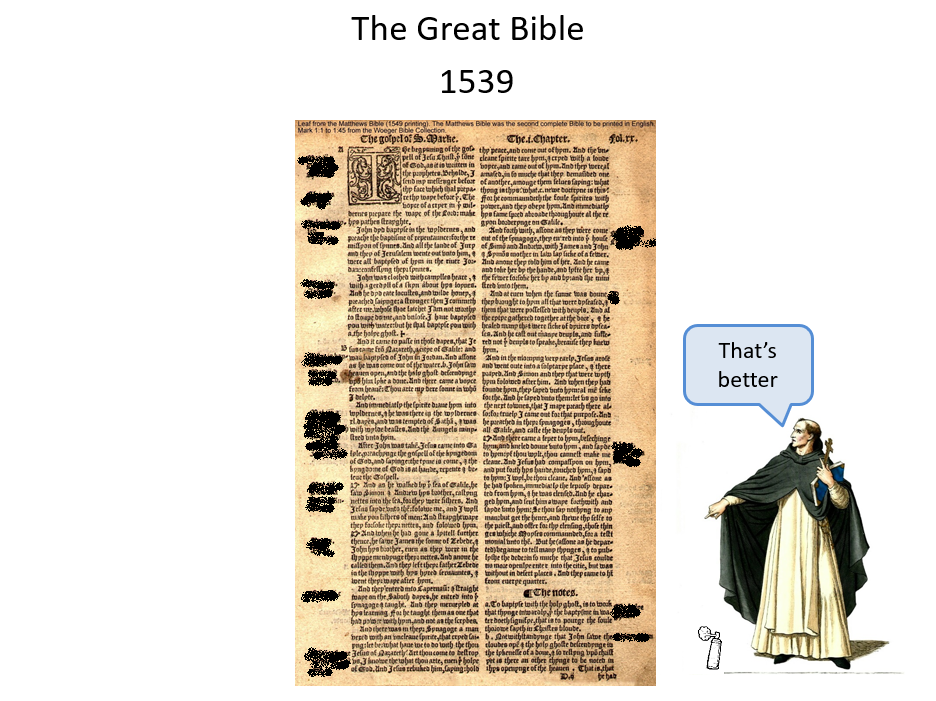
What was known as The Great Bible appeared in 1539. This was Matthew’s Bible with no marginal notes. It was this Bible which was sanctioned by the Church of England. But still the Church of England did not like the idea of the common man reading the Bible for himself.
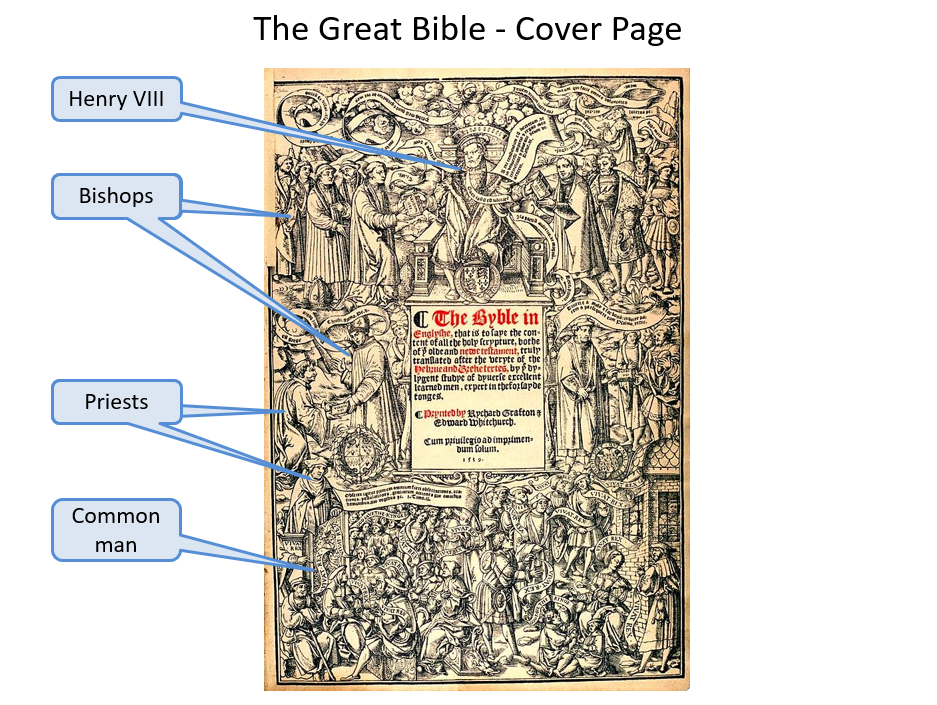
The central figure at the top is Henry III. At his right-hand bishops gratefully receive the Bible from the King. Under the bishops, the priests are depicted receiving the Bible from the bishops, and under the priests, the common man. The common man is not receiving the Bible but being preached at. This is 16th century propaganda. The King (Henry VIII) is depicted as the head of state and church. The hierarchy of power proceeds from the King, to the bishops, and to the priests dominating the common man at the bottom of the pile. The title page shows the idea that the common man should receive religious instruction from the priests, not from the Bible directly.
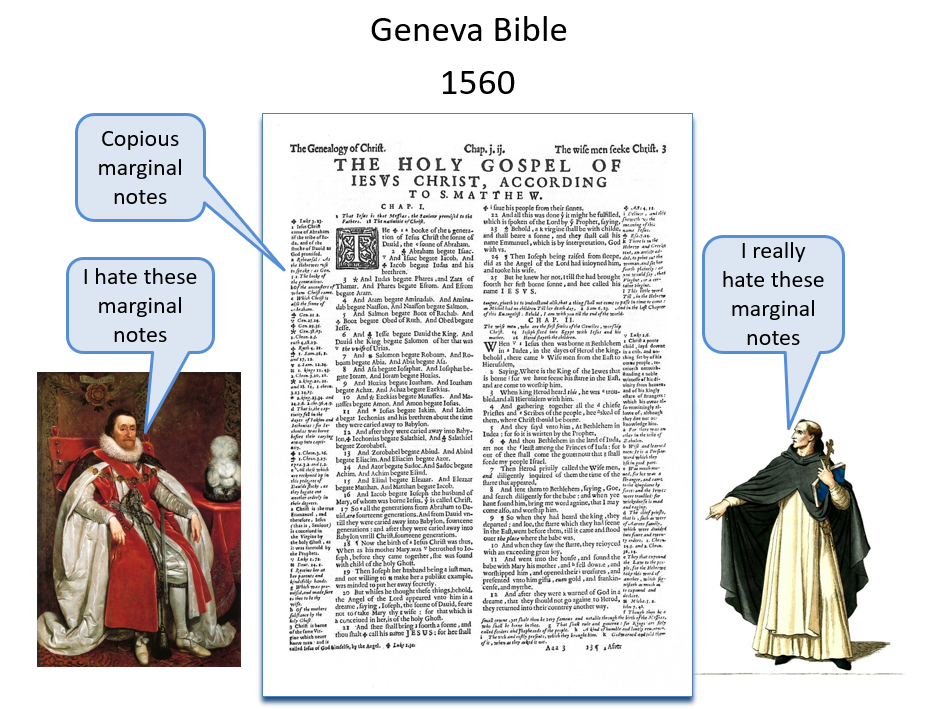
In 1560, the Geneva Bible appeared, (so called because it was produced in Geneva). This had copious marginal notes written to help its readers make sense of the Bible. However, the notes had a very anti-establishment flavour. King James I hated the marginal notes, because the notes depicted kings as tyrants and despots (which many of them were). The Geneva Bible threatened to undermine the power of the church and state. The clergy feared that they would lose their power and control over the common man.
The Geneva Bible was banned from England, because of its marginal notes. To possess a Geneva Bible was dangerous.
It was the popularity of the Geneva Bible which was a major reason why king James I authorised what is known as the King James version.
What was so bad about the marginal notes?
Example of the Geneva Bible notes.
Dan 6:22 My God sent His angel and shut the lions’ mouths, so that they have not hurt me, because I was found innocent before Him; and also, O king, I have done no wrong before you.
Note: For he disobeyed the king’s wicked commandment in order to obey God, and so he did no injury to the king, who ought to command nothing by which God would be dishonoured.
In other words, the commands of the king are to be disobeyed when they conflict with the will of God. Naturally king James I was not amused.
Another example of the Geneva Bible notes.
Dan 11:36 “Then the king shall do according to his own will: he shall exalt and magnify himself above every god, shall speak blasphemies against the God of gods, and shall prosper till the wrath has been accomplished; for what has been determined shall be done.
Note: So long the tyrants will prevail as God has appointed to punish his people: but he shows that it is but for a time.
In other words, God raises up tyrants to punish his people for their sins, the days of tyrants are numbered. Naturally James I was not amused.
The Geneva Bible notes use the word tyrant to refer to kings. The King James Version never does!
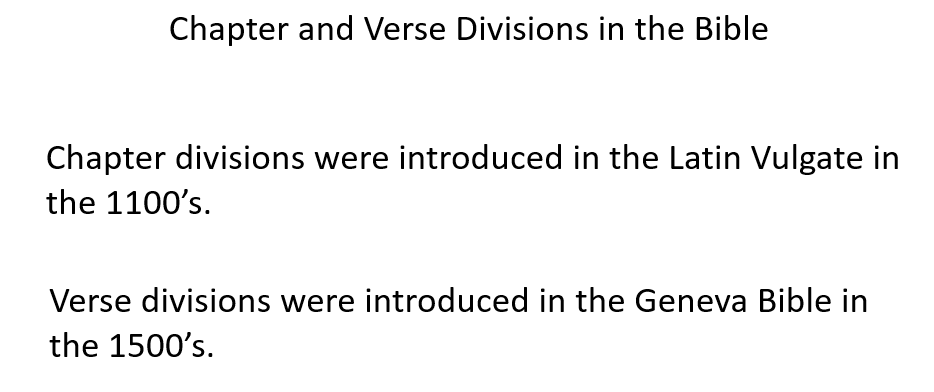
A quick sidebar for your information.
We are very familiar with Chapter and Verse divisions in the Bible. You don’t find them in the original Hebrew and Greek manuscripts. They were added. Chapter divisions were introduced in the Latin Vulgate in the 1100’s. Verse divisions were introduced in the Geneva Bible in the 1500’s. Subsequent translations of the Bible followed the same chapter and verse divisions.
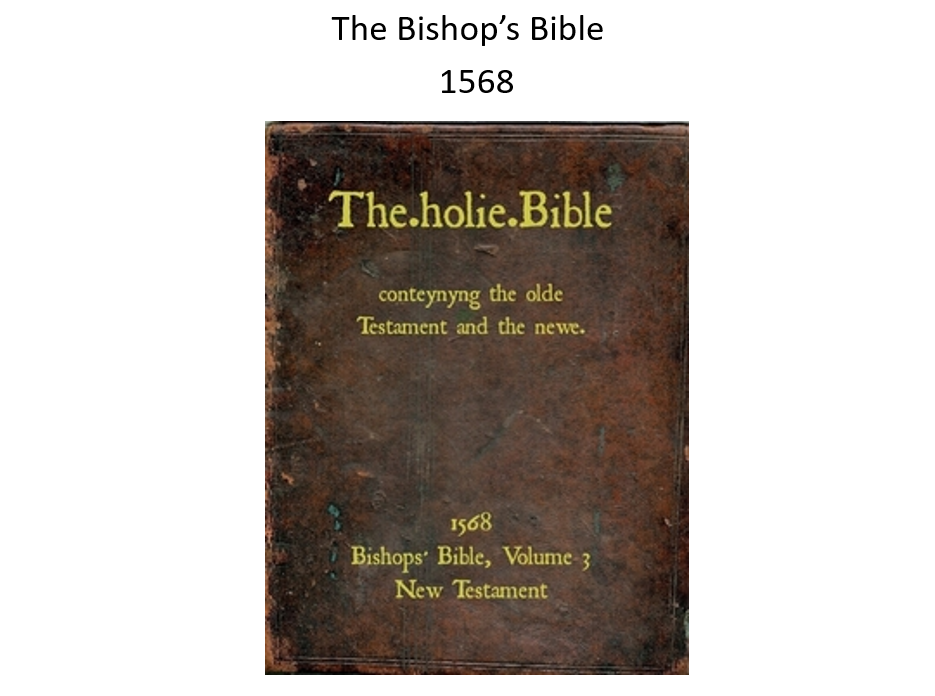
The problem the Church of England had was that they didn’t like the Geneva Bible and the alternative, the Great Bible, wasn’t very good in parts. Most of the Old Testament was translated from the inaccurate Latin Vulgate. Some bishops remedied this by doing their own translation. They kept the good bits (which were basically what Tyndale had translated) and translated the rest from the original Hebrew. This became known as the Bishop’s Bible, which appeared in 1568.
To address the problem of the Geneva Bible, in 1604 James I issued a royal decree that a new translation of the Bible should be made –which was the only translation to be used in all the churches of England.
King James I gave some rules to the translators.
- The Bishop’s Bible should be followed and altered as little as possible. The Pentateuch and New Testament of the Bishop’s Bible were based on Tyndale’s translation. Thus, a lot of Tyndale’s work made its way into the King James Version.
- Ecclesiastical words are to be kept.
- No marginal notes.
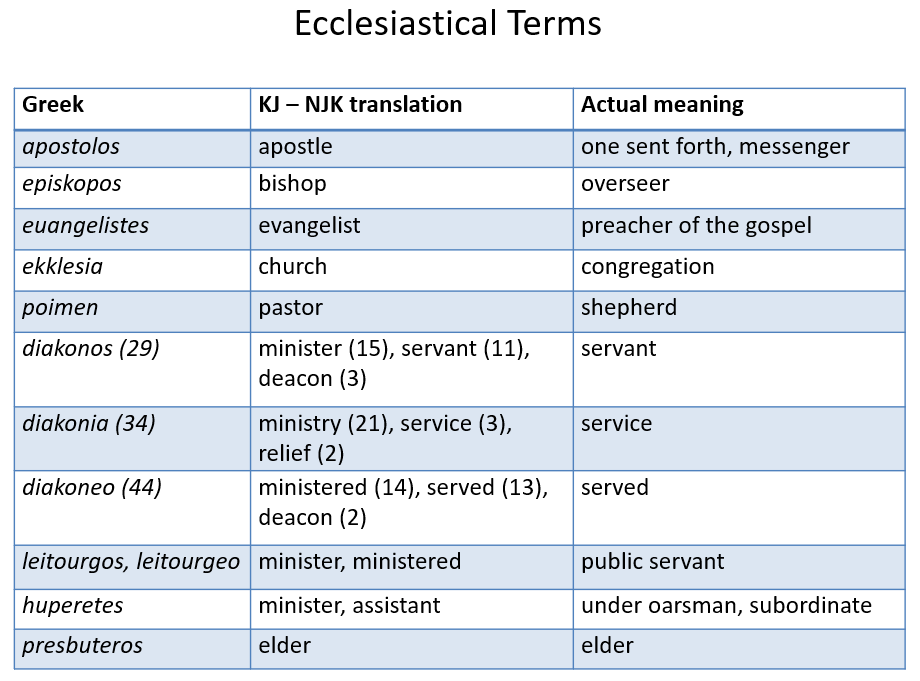
What exactly did the second rule which king James I gave to his translators mean? The problem king James I and the church leaders had was that the Bible, in particular the New Testament, doesn’t support or endorse the idea of a church which looks like the Catholic Church or the Church of England. This rule effectively instructed the translators to mistranslate certain words to support the structure and hierarchy of the Church of England.
For example, the Greek ekklesia was not to be translated as “congregation” as William Tyndale had done, but rather as “church”.
The second rule was king James I controlling how the translators translated ecclesiastical titles. King James I wanted to model the Church of England on the Catholic Church with its various ecclesiastical titles of authority, to lord it over and control the common man. These ecclesiastical titles are man-made titles with the intention to impose authority over the church membership.
The image above shows a list of Greek words with the King James Version translation along with the actual meaning.
As you can see, the New Testament only mentions the following titles for the church: – messengers, overseers, elders, preachers, shepherds and servants – all serving and helping the brethren in humility. This wouldn’t have helped king James I exert his authority over the common man, which is why he instructed different words to be used.
An example of a mistranslated title is the Greek word, diakonos. Not including its derivatives, it appears 29 times in the New Testament. It’s translated as ‘minister’ 15 times; ‘servant’ 11 times and ‘deacon’ only 3 times. The word diakonos just means ‘servant’.
Jesus had something very important to say about how the church should function.
Mat 20:25 But Jesus called them to Himself and said, “You know that the rulers of the Gentiles lord it over them, and those who are great exercise authority over them.
Mat 20:26 Yet it shall not be so among you; but whoever desires to become great among you, let him be your servant.
Mat 20:27 And whoever desires to be first among you, let him be your slave—
Mat 20:28 just as the Son of Man did not come to be served, but to serve, and to give His life a ransom for many.”
The church should function not under a government where the leaders are oppressors and bullies, but rather one where the leaders are the greatest servants.
Christ said to His church in Ephesus:
Rev 2:6 But this you have, that you hate the deeds of the Nicolaitans, which I also hate.
But to His church in Pergamos, Christ said:
Rev 2:15 Thus you also have those who hold the doctrine of the Nicolaitans, which thing I hate.
What does Nicolaitan mean? It only appears twice in the Bible. The context doesn’t shed light on its meaning so we have to look at the word itself. Nicolaitan literally means “victorious over the people”. The doctrine of the Nicolaitans is the doctrine that the leadership should have victory over the brethren or that the leadership should lord it over the brethren. Christ said he hates this. He said the same thing in Mat 20 which we read.
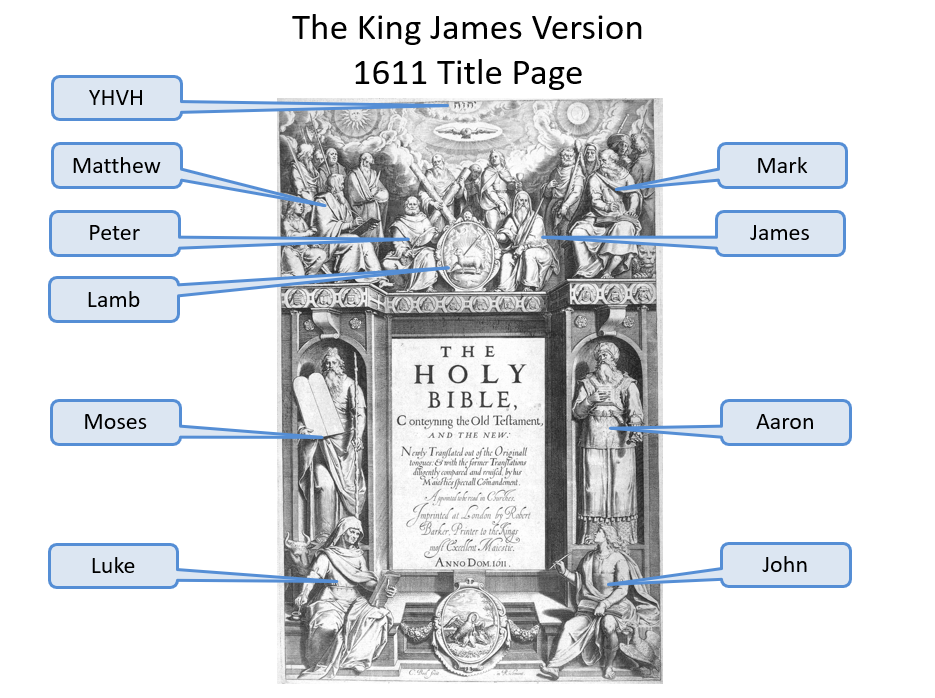
It wasn’t until about the time of the King James Version, the early 1600’s, that the Bible finally became accessible to the common man in England. The two problems that held back the availability of the Bible: expense and not having a translation in the common language had finally been overcome.
At long last, 1½ thousand years after the Bible was completed, it was finally easily accessible to the common man – at least in Europe.
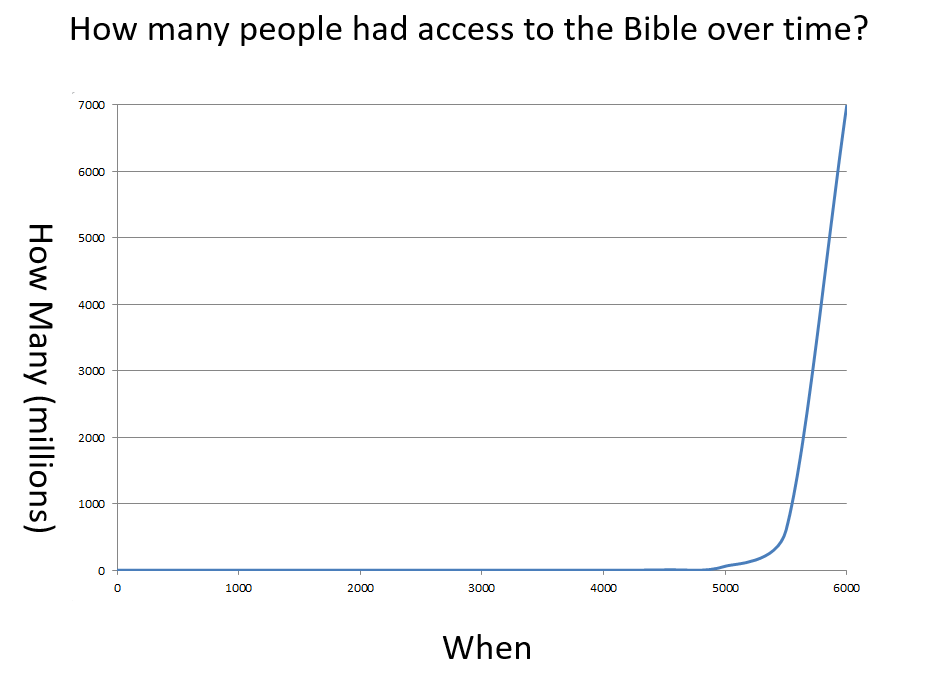
In the 1600’s Europeans had access to the Bible, but what about the rest of the world? The colonising powers of France, Portugal, Spain and England spread the Bible to the Americas, Africa and parts of Asia. Various missionary societies spread the Bible across the whole earth. If you consider the number of people who have had easy access to the Bible in their own language, throughout history it has been relatively few, until the last few hundred years. Most of the people living today — have easy access to the Bible in their own language. The Bible was written predominantly for this period of the end of the age.
We shouldn’t take the easy access we have to the Bible for granted. We should be thankful, that firstly we can all easily afford a Bible, and secondly, that translations are available in our own language. As we have seen, men such as William Tyndale lost their lives to make the Bible accessible to the common man.
There have always been men who have suppressed the truth.
Rom 1:18 For the wrath of God is revealed from heaven against all ungodliness and unrighteousness of men, who suppress the truth in unrighteousness,
There were such men in Jesus’ time. Referring to Jesus, this is what the religious leaders of His time said.
Joh 11:47 Then the chief priests and the Pharisees gathered a council and said, “What shall we do? For this Man works many signs.
Joh 11:48 If we let Him alone like this, everyone will believe in Him, and the Romans will come and take away both our place and nation.”
Joh 11:53 Then, from that day on, they plotted to put Him to death.
The chief priests and the Pharisees perceived Jesus as a threat to their power, so they plotted to kill him.
Likewise, in the 1500’s when Tyndale’s translation was perceived as a threat by the religious leaders of that time, they burned the translation and they burned the translator. They suppressed the truth in unrighteousness.
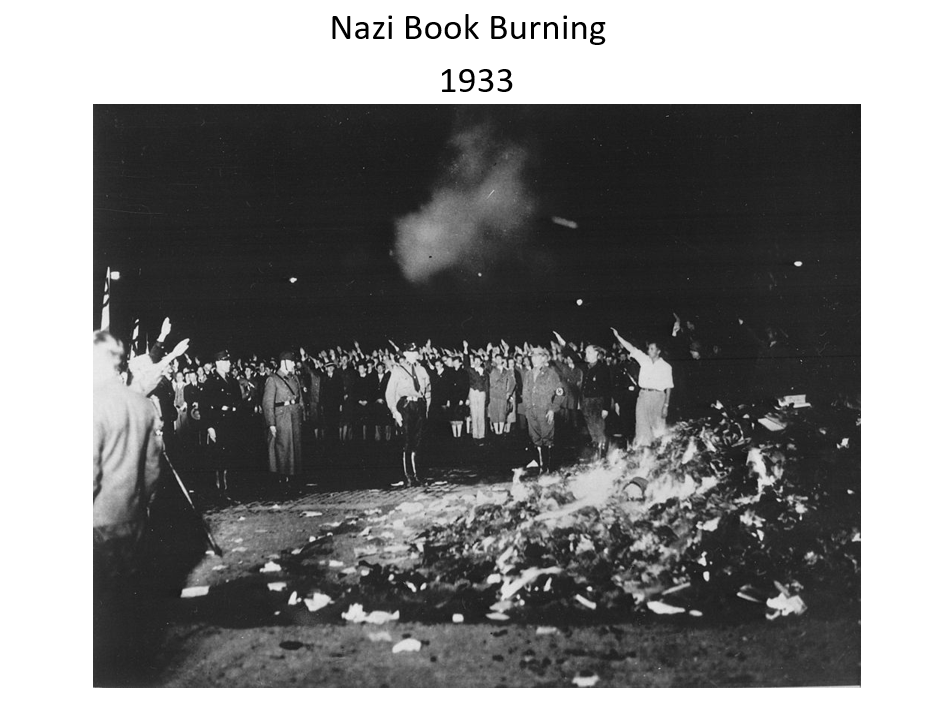
More recently the Nazi’s in 1933 burned books, mostly books by Jewish authors.
We know that in the future there will be a famine of the hearing of the words of God.
Amo 8:11 “Behold, the days are coming,” says the Lord GOD, “That I will send a famine on the land, Not a famine of bread, Nor a thirst for water, But of hearing the words of the LORD.
Perhaps this is referring to a time when the Bible is banned. What if one day authorities banned the Bible on the basis it has too much hate speech — hate speech against homosexuals, against fornicators and adulterers. What if the authorities have public burnings of Bibles and made possession of a Bible in printed or electronic form an offense punishable by death? Most people would comply and not risk losing their lives.

In conclusion, today we have easy access to multiple translations. But this hasn’t always been the case. It has only been the last few hundred years that the Bible has been readily available to the ordinary person. Before that, it either didn’t exist or it was only accessible to priests and scholars. We should be thankful, that firstly we can all easily afford a Bible, and secondly, that translations are available in our own language. As we have seen, men such as William Tyndale lost their lives to make the Bible accessible to the common man.